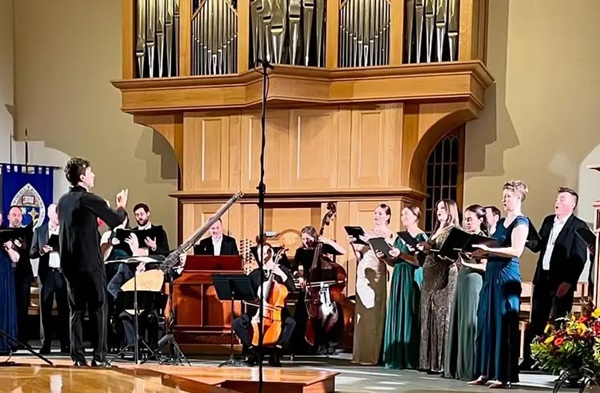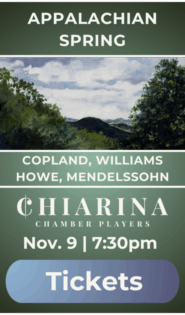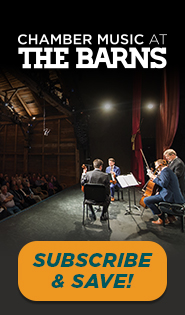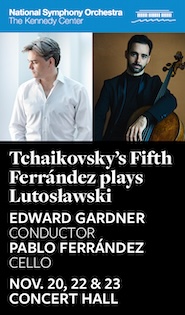Robertson launches The Thirteen’s 13th season with masterful Bach

Matthew Robertson conducted The Thirteen in Bach’s motets Friday evening at Virginia Theological Seminary’s Immanuel Chapel. Photo: Marty Burnett
The chamber choir known as The Thirteen opened its new season Friday evening in style, with a monumental program devoted to all of J.S. Bach’s motets. The robust sound of seventeen professional singers, plus four instrumentalists, easily filled the slightly dry acoustic of Immanuel Chapel, on the campus of Virginia Theological Seminary in Alexandria.
Exactly what is considered to be “all of Bach’s motets” is a matter of dispute, but conductor Matthew Robertson selected the six motets generally attributed to Bach (BWV 225 to 230), plus one of those at times attributed to another composer. The program, including some of Bach’s most virtuosic choral scores, proved an imposing challenge, especially in the works for double-SATB chorus, all but one reserved for the second half of the concert.
Some scholars have questioned Bach’s authorship of Lobet den Herrn, alle Heiden, the only motet composed in four voices, too, although the demanding style certainly sounds of a piece with the other motets. This performance responded to the demanding nature of the score, with the upward arpeggiated motif of the opening line soaring like rockets in all voices one after the other. Robertson slowed down the middle section (“Denn seine Gnade”), drawing attention to the long held note on “Ewigkeit” (eternity) that appeared in all four voice parts.
The much faster concluding “Alleluia” sounded crisp and delineated in both voices and instruments, marked out so cleanly by Robertson’s gestures. The evidence concerning instrumental accompaniment in Bach’s motets leans toward instruments doubling all the vocal parts, with such parts actually written out for one motet. Robertson settled on using only a continuo group, as found written out for Lobet den Herrn and one other motet.
Robertson emphasized the imperative nature of the opening line of Komm, Jesu, komm, holding out the opening notes to full duration rather than cutting them off early. The text painting suggested by Bach’s vocal writing came across with precise diction and phrase shaping, as in the steep descent of “Der Kraft verschwindt,” trailing off like strength being depleted, and the biting dissonance of “Der saure Weg” incarnating the bitterness of life.
The highlight of the evening came with the most poignant motet of them all, Jesu, meine Freude, the only one written in five vocal parts. The singers declaimed the text with impeccable diction in the chorale sections, differentiating the meaning of the words with more explosive consonants where appropriate (like the thunder and lightning of “kracht und blitzt”). In the intervening scriptural verses, musical rhetoric underscored the text even more, as in the full-length chords on the word “nichts” in the second section, as if emphasizing that there is absolutely no condemnation for those who follow Christ.
Sections for a reduced number of parts offered the most gorgeous moments of the evening, including the softly flowing lines of the SSA movement, “Denn das Gesetz,” and the maternal warmth of the alto section featured in the ATB movement, “So aber Christus.” The movement that most suspended time in its beauty was the critical SSAT section, “Gute Nacht, o Wesen,” where the silence of the bass line created a floating treble-oriented quality. In a clever move, Robertson had the six singers on the alto line intone the chorale from the three portals of the sanctuary, so that the familiar tune surrounded the audience.
Based on the balances heard throughout the evening, Robertson might have added some singers to his soprano section. The high-flying first soprano part in particular, in the four double-choir motets on the second half, went pale with strain by the end of the two-hour program. Der Geist hilft was sung with finesse but underplayed some of the possible emotional parts, as in the “inexpressible groans” of the melismas toward the middle.
In Fürchte dich nicht, Robertson’s added sighing rests to the descending chromatic line “denn ich habe dich erlöset” in the contrapuntal section for four parts. While certainly heightening interest for the ear, this choice did not seem connected to anything in the text, giving the impression of a somewhat mannered interpretation.
Robertson cleverly paired this motet with Ich lasse dich nicht, to which it seems quite similar in format, although it was formerly attributed to Johann Christoph Bach, Johann Sebastian’s father’s cousin. Now thought to be much earlier J.S. Bach and given its own BWV number, its less demanding style of vocal writing provided a needed respite for the singers.
The evening’s intended climax came with the epic Singet dem Herrn ein neues Lied, for which Robertson supercharged the tempos of the outer sections. While thrilling on the surface, the speed endangered the clarity of the melismatic writing, for the singers and especially for the instrumentalists. After pushing the divided soprano sections to their limits all evening, the final chorus, with both choirs united on just four parts, sounded on much more solid footing.
The program will be repeated 7:30 p.m. Saturday and 5 p.m. Sunday at different locations. thethirteenchoir.org





